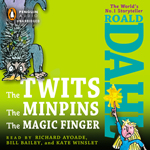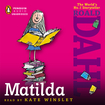
 The Twits, The Minpins, & The Magic Finger
The Twits, The Minpins, & The Magic Finger
By Roald Dahl; Read by Richard Ayoade, Bill Bailey, and Kate WinsletPublisher: Penguin Audio
Publication Date: 26 September 2013
[UNABRIDGED] – 2 hours
Themes: / children’s fantasy / short stories / creatures /
Publisher summary:
THE TWITS
How do you outwit a Twit? Mr. and Mrs. Twit are the smelliest, nastiest, ugliest people in the world. They hate everything—except playing mean jokes on each other, catching innocent birds to put in their Bird Pies, and making their caged monkeys, the Muggle-Wumps, stand on their heads all day. But the Muggle-Wumps have had enough. They don’t just want out, they want revenge.THE MINPINS
Little Billy strays into the forest, where he meets the Minpins?tiny people who live within the trees. The Minpins tell Billy about The Gruncher, who preys on them. So Billy embarks on a mission to rid the Minpins of their foe once and for all, and sets off?on the back of a swan?to confront The Gruncher.THE MAGIC FINGER
What happens when the hunter becomes the hunted? To the Gregg family, hunting is just plain fun. To the girl who lives next door, it’s just plain horrible. She tries to be polite. She tries to talk them out of it, but the Greggs only laugh at her. Then one day the Greggs go too far, and the little girl turns her Magic Finger on them. When she’s very, very angry, the little girl’s Magic Finger takes over. She really can’t control it, and now it’s turned the Greggs into birds! Before they know it, the Greggs are living in a nest, and that’s just the beginning of their problems.
Although I have enjoyed many of the movies made from Roald Dahl’s books (most notably James and the Giant Peach) I cannot recall reading any of his books except Charlie and the Chocolate Factory which was … fine but not world changing for me. That’s kind of odd too, when I think about it, because I was the right age to be the prime audience when a lot of his books were coming out but I was largely oblivious to them. (Yep. Dated myself. Don’t care.)
However, as I have learned in the past, audio often breaks open a book or author who I didn’t find congenial in print. It was that way with Coraline by Neil Gaiman. It was that way with the last half of The Lord of the Rings (yes, I am ashamed but I will not lie). And, now, it is that way with Roald Dahl.
The Twits are the most horrible couple in the world and quite hateful to each other, until they are under attack from a common enemy. Even then they are horrible which makes it quite gratifying to see them get their comeuppance from the Muggle-Wump monkey family and the Roly Poly bird. This story had the most disgusting description of a beard I have ever encountered. Even while I was grimacing, I was also laughing because Dahl had such a clever way with words. Narrator Richard Ayoade had a lovely, calm British narration style that didn’t preclude hilarious, low-class voices for the Twits. First class stuff.
The Minpins has the most perfect monster name I’ve ever heard — The Gruncher, a fire-breathing, boy eating creature in Sin Forest. It sends Billy right up a tree where he meets the Minpins and they form an ingenious alliance to deal with their common foe. Bill Bailey narrated this with a great deal of gusto which didn’t detract in the least from the story.
The Magic Finger was my favorite story, partially because Kate Winslet’s narration won me over from the very beginning. I also just couldn’t resist the little girl who “puts my Magic Finger” on those who displease her. The Greggs are worthy of a magic finger punishment because they are such keen hunters. What the Magic Finger does is typical Dahl ingenuity at its best.
All three of these are little stories but each is a gem which children would love. Heck, I liked them quite a bit myself and, as I have revealed, I am far past the age of tender youth. I am now going to look for more Roald Dahl in audio, possibly even revisiting Charlie and the Chocolate Factory.
Posted by Julie D.
 Matilda
Matilda